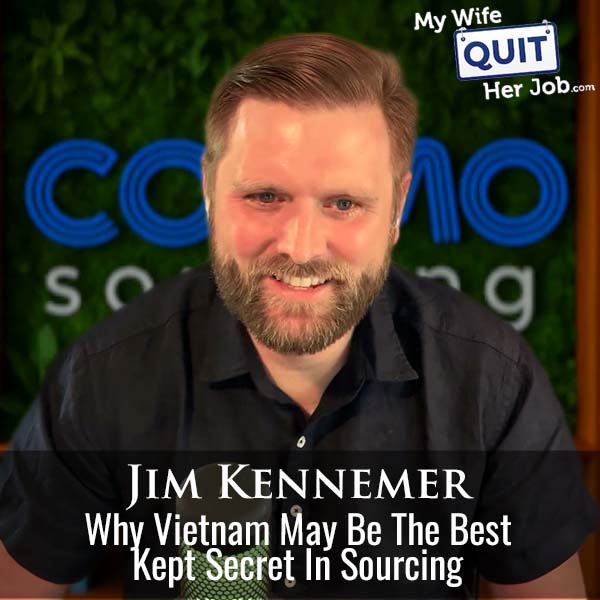603: Why Vietnam May Be The Best Kept Secret In Sourcing With Jim Kennemer

```html Vietnam Emerges as Key Sourcing Alternative Amid Trade Uncertainty
As global trade tensions persist, particularly concerning tariffs between the United States and China, Vietnam is increasingly being recognized as a viable and often advantageous alternative for businesses seeking to diversify their sourcing strategies. While China remains a dominant player in global manufacturing, rising costs and geopolitical uncertainties are prompting businesses to explore options in Southeast Asia, with Vietnam leading the charge.
Expert Insights on Vietnam's Sourcing Potential
Jim Kennemer, founder of Cosmosourcing and sourcinghub.io, recently shared his insights on the My Wife Quit Her Job podcast, highlighting Vietnam's potential as a sourcing hub. Kennemer, who has extensive experience working with Vietnamese factories and suppliers, emphasized that Vietnam offers a compelling combination of lower costs, greater flexibility, and a sourcing ecosystem that is often overlooked by businesses primarily focused on China.
"While most sellers are fixated on China, Vietnam presents a compelling alternative with potentially lower costs and greater flexibility," Kennemer noted. He further elaborated on the growing interest in AI-driven sourcing solutions, observing a significant increase in traffic and conversions from AI chatbots recommending his services.
Historical Context and Current Landscape
Vietnam's rise as a manufacturing hub is not an overnight phenomenon. Over the past decade, the country has steadily invested in its infrastructure and manufacturing capabilities, attracting foreign investment and establishing itself as a competitive player in various industries. This growth has been further accelerated by the ongoing trade disputes between the U.S. and China, prompting companies to seek alternative sourcing locations to mitigate tariff risks.
However, the current trade landscape remains fluid. Recent comments regarding potential tariff adjustments, even those made informally, can significantly impact business decisions. "People just want certainty, and there's not certainty in tariffs," Kennemer stated, underscoring the challenges businesses face in navigating the evolving trade environment.
Navigating Tariffs and Trade Agreements
One of the key concerns for businesses sourcing from Vietnam is the uncertainty surrounding tariffs. While Vietnam currently enjoys relatively favorable trade terms with many countries, potential changes to these agreements can significantly impact the cost of goods. Kennemer pointed to the potential for increased tariffs on goods originating from China but processed in Vietnam, highlighting the complexities of international trade regulations.
According to Dr. Eleanor Hill, an international trade economist at the Global Commerce Institute, "The key is understanding the rules of origin. Companies need to meticulously track the sourcing of raw materials and components to ensure compliance with trade regulations and avoid unexpected tariffs." Hill also emphasized the importance of staying informed about evolving trade policies and engaging with legal experts to navigate the complexities of international trade.
Vietnam's Strengths and Considerations
Despite the uncertainties, Vietnam offers several advantages as a sourcing destination. The country boasts a well-developed apparel and textile industry, with a large number of factories and a skilled workforce. Kennemer noted that cut and sew items, in particular, are often more competitively priced in Vietnam compared to China, even before factoring in tariffs.
Apparel and Textiles: Vietnam's most developed industry, offering a wide range of products from high-tech gear to basic apparel. Furniture: A growing sector, although typically requiring larger order quantities. Flexibility: Vietnamese factories are often more willing to accommodate smaller orders and customize products compared to their Chinese counterparts.
Minimum Order Quantities (MOQs)
While Vietnam offers many advantages, businesses should be aware of the potential for higher MOQs compared to China. According to Kennemer, Vietnamese factories often expect larger initial orders, which can be a barrier to entry for smaller businesses. For apparel, MOQs typically start around 1,000 units, while furniture orders often require a full container load.
Looking Ahead
As the global trade landscape continues to evolve, Vietnam is poised to play an increasingly important role as a sourcing alternative. Businesses that are willing to invest the time and effort to understand the Vietnamese market, build relationships with local suppliers, and navigate the complexities of international trade can reap significant rewards.
The key to success lies in staying informed, being adaptable, and seeking expert guidance to navigate the ever-changing world of global sourcing. ```
Originally sourced from: WifeQuitHer Job
